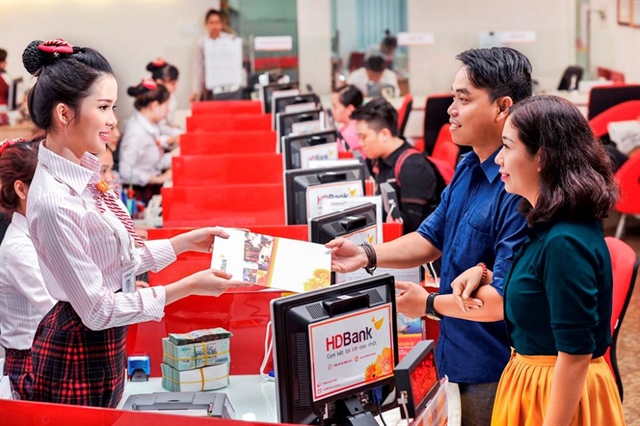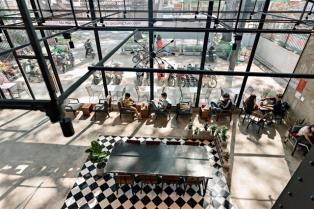On October 10, the HCM City Development Joint stock Commercial Bank (HDBank) announced that its shareholders had approved a plan to buy a maximum of 5 per cent of its 981 million shares being traded on the market, equivalent to 49 million shares.

On October 10, the HCM City Development Joint stock Commercial Bank (HDBank) announced that its shareholders had approved a plan to buy a maximum of 5 per cent of its 981 million shares being traded on the market, equivalent to 49 million shares.
The VND1.3 trillion (US$57.5 million) it is estimated to cost will come from its reserves and surplus.
The lender expects this to push up the price of its shares, which trade at around VND27,500.
The buyback would also be a highly effective investment for the bank and its shareholders, its top executives said.
Vietnam Prosperity Joint-Stock Commercial Bank (VPBank) also unveiled plans to buy back stocks to improve earnings per share and bolster their price.
It is expected to buy a maximum of 50 million shares from the market this quarter, equivalent to 1.97 per cent of the float.
VPBank already has over 73.2 million treasury shares, and the repurchase of the 50 million stocks will take that to almost 5 per cent of charter capital.
Two other banks also bought back large numbers of stocks: Tien Phong Commercial Joint Stock Bank (TPBank) and Military Commercial Joint Stock Bank (MB).
In June this year, the former bought 24 million shares, equivalent to 2.8 per cent of its charter capital. At an average of VND26,117 per share, the lender paid over VND600 billion for the stocks.
In March, Military Bank repurchased 47 million shares for VND1 trillion at the average price of VND21,999.
Analysts said each bank has its own rationale for buying back stocks, but the basic reasons are to reduce the float to support the share price and to buy them when they are available at low valuations to sell at a profit later.
Since the beginning of this year, the VN-Index has gained over 14 per cent but bank shares have been moving in the opposite direction, with which many of them falling sharply.
Techcombank, one of the five largest banks by market capitalisation, trades at average VND22,000, down 15 per cent for the year and 40 per cent since June 2018.
ACB, SHB and STB have lost 25 per cent, 12 per cent and 8 per cent, respectively.
One question that arises is if the buyback of stocks would really prop up their prices.
Analysts said it would surely benefit shareholders since the repurchase would reduce the supply of shares and improve their EPS and other ratios, making them attractive to investors.
Foreign start-ups dominate budget hotel booking
In late September, Singaporean budget hotel-booking platform RedDoorz celebrated its first anniversary in Viet Nam.
It entered the Vietnamese budget hotel market last September after four years in Singapore, Indonesia and the Philippines.
Within a year, it has tied up with 125 hotels in the five cities of HCM City, Ha Noi, Da Nang, Vung Tau, and Da Lat, and the figure is expected to reach 200 by year-end.
With rooms booked on it in Viet Nam priced from VND249,000 per night on average, the platform’s occupancy rate has topped 75 per cent.
Customers can pay with e-wallets like Payoo, MoMo and Zalopay when they make a booking.
Established in 2015 in Singapore, the start-up has set up a network with more than 1,400 hotels in 100 cities in four countries and the number of customers is on the rise.
Indian start-up OYO, in spite of just entering the Vietnamese market in July, has already linked up with 90 hotels in nine cities in Viet Nam, including Phu Quoc and Nha Trang in addition to the major cities.
It has said it will invest over $50 million in Viet Nam to expand its budget hotel chain with 20,000 rooms in ten cities, and create 1,500 direct and indirect jobs.
Rooms on OYO cost around VND400,000 per night on average.
Founded in 2013 by Ritesh Agarwal, 25, OYO currently operates in 800 cities across 80 countries, including the US, the UK, China and Japan.
These foreign start-ups have not only been attracting travellers from abroad to Viet Nam but also a considerable number of local tourists, especially young people who have modest budgets but are tech-savvy.
One common feature of these players is their great appreciation of the potential of Viet Nam’s budget travel market, and they offer reasonable and convenient services to thrifty independent travellers.
According to RedDoorz, Viet Nam shows great promise for development. Some 85 million local tourists spend almost 23 per cent of their travel budget on accommodation while 18 million foreign tourists spend 33 per cent of their budget.
The country’s hotel market is forecast to grow by 13.2 per cent this year to $500 million.
Anil Goel, OYO’s chief technology and product officer, said Viet Nam’s tourism growth in recent years was the reason for his company’s investment in the country.
"In 2019, Viet Nam is expected to have 103 million visitors, which means a great opportunity lies ahead of us to build a strong and sustainable hospitality eco-system in the country."
Analysts said the Fourth Industrial Revolution has created opportunities for start-ups to participate in the budget travel segment since it requires low investment.
Some Vietnamese start-ups have also begun to build budget hotel chains, among them AHArooms, Manmo, V.E.O, and Xper.
But most of them have been around for only a year or two, and so are still not strong enough to take on foreign rivals.
Besides, they are yet to enter other segments such as booking flight tickets.
The biggest problem they face is the lack of a start-up eco-system in the country that could foster their growth, according to analysts. — VNS





